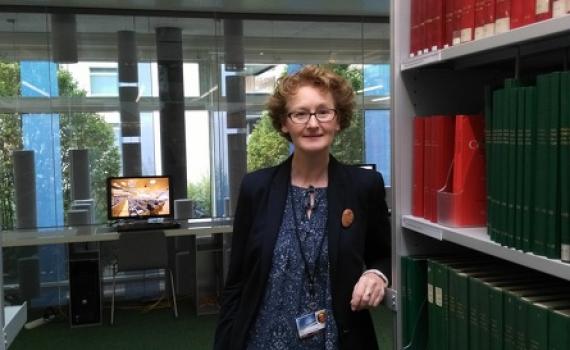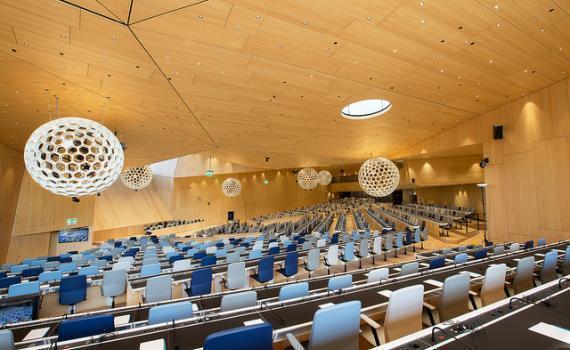
Teresa Hackett, EIFL Copyright and Libraries Programme Manager, looks forward to the first full meeting of WIPO’s copyright committee in two years, and calls for action to support libraries before, during and after the meeting.
The 42nd session of WIPO's Standing Committee on Copyright and Related Rights (SCCR), the global forum that sets international copyright law and policy, takes place in Geneva from 9 - 13 May 2022. It is the first full meeting since the start of the pandemic. Find out what’s on the agenda, and how you can support libraries in the discussions.
Three topics of high importance to libraries will be discussed during the week: the impact of the COVID-19 pandemic on libraries and education, a draft treaty for the protection of broadcast organizations, and an exciting new proposal for a work programme at SCCR on limitations and exceptions (L&Es) for libraries and archives, education and research.
Countries with good copyright exceptions were better prepared for COVID
On Monday, 9 May, an Information Session on the Impact of the COVID-19 Pandemic on the Copyright Ecosystem will explore the impact on the cultural, creative and educational ecosystem, including copyright, related rights, and limitations and exceptions. The pandemic has highlighted the need for copyright laws that support online access to resources for education and research - now and in any future emergency situations.
For the information session, EIFL submitted examples of the impact of COVID-19 on the work of libraries in partner countries, including Kenya, Malawi, South Africa, and Zimbabwe. The examples show that in times of a global emergency, libraries and educators need clear rights backed by law. Countries with good exceptions for online uses were, in general, better prepared to ensure continuity of learning and research during the pandemic, than those with no or more restrictive provisions.
The broadcast treaty needs adequate exceptions
Agenda item 6 concerns a proposal for a treaty to create a new right to benefit broadcast organizations (SCCR/42/3) by protecting broadcast content. From a library perspective, it is imperative that any new treaty must have adequate exceptions to ensure fair access to broadcast content by libraries for social, educational and public interest purposes, for example, to show educational TV programmes to children in public libraries.
Unfortunately, the exceptions in the current draft treaty text are highly deficient. For example, exceptions that are part of other treaties are missing e.g. disability exceptions in Marrakesh, teaching and research exceptions in the Rome Convention, and the exceptions that are there are optional (they should be mandatory).
Unless these issues are addressed, the exceptions won’t be automatically taken up if and when the treaty is implemented by countries. The burden of ensuring public access will be shifted to civil society, including the library community, in each and every country that adopts the treaty. Libraries need fair and guaranteed access to broadcast content for non-commercial, public interest purposes, and the rules need to be set at WIPO.
Workplan proposal: A good basis for moving forward on L&Es
Agenda items 7 and 8 will discuss a new proposal by the African Group of WIPO member states for a draft work programme on L&Es at SCCR (SCCR/42/4).
The proposal provides a good basis for advancing discussion on L&Es. It builds on the substantial work done in the committee up to 2019, that culminated in three regional seminars and an international conference in Geneva. It reflects key priorities for concrete action identified in WIPO’s report summarizing the seminars and conference (SCCR/40/2) - preservation by libraries, archives and museums, and adapting exceptions for online teaching, learning and research.
It also asks the WIPO secretariat to convene information sessions, commission studies and provide models on new and emerging issues, such as text and data mining, the UNESCO Recommendation on Open Science (2021), choice of law for cross-border uses, and safe harbour protections for education and cultural heritage institutions.
The work programme would provide a solid focus for the L&E agenda at SCCR. It would enrich discussions by including new developments and emerging topics, such as text and data mining, in fulfillment of WIPO’s role as the global forum for IP information and policy.
Action! Supporting libraries before, during and after SCCR/42
- Before SCCR/42,
- You can help EIFL and our library allies at WIPO by asking your national copyright office to support the library positions on the SCCR agenda - get in touch with me at teresa.hackett@eifl.net for a sample letter and contact details.
- It’s not too late to send your examples of the impact of COVID-19 on the work of your libraries. If you have any examples you would like to share, please send them to me at teresa.hackett@eifl.net
- During SCCR/42, you can follow the live webcast each day or catch up later. SCCR meets each day from 10am - 1pm and 3pm - 6pm CET (Geneva time). Check your local time here.
- After SCCR/42, follow up with your delegate on the outcomes.
I will be representing EIFL at SCCR/42, with Dick Kawooya, University of South Carolina; Anthony Kakooza, Makerere University, Uganda, Desmond Oriakhogba, University of Venda, South Africa and Awa Cissé Diouf, Universite Cheikh Anta Diop (UCAD), Senegal.
We are looking forward to returning to Geneva - SCCR is back in business!
Further information
EIFL webinar: Get ready for WIPO. Watch the recording and view the slides.
SHARE / PRINT








